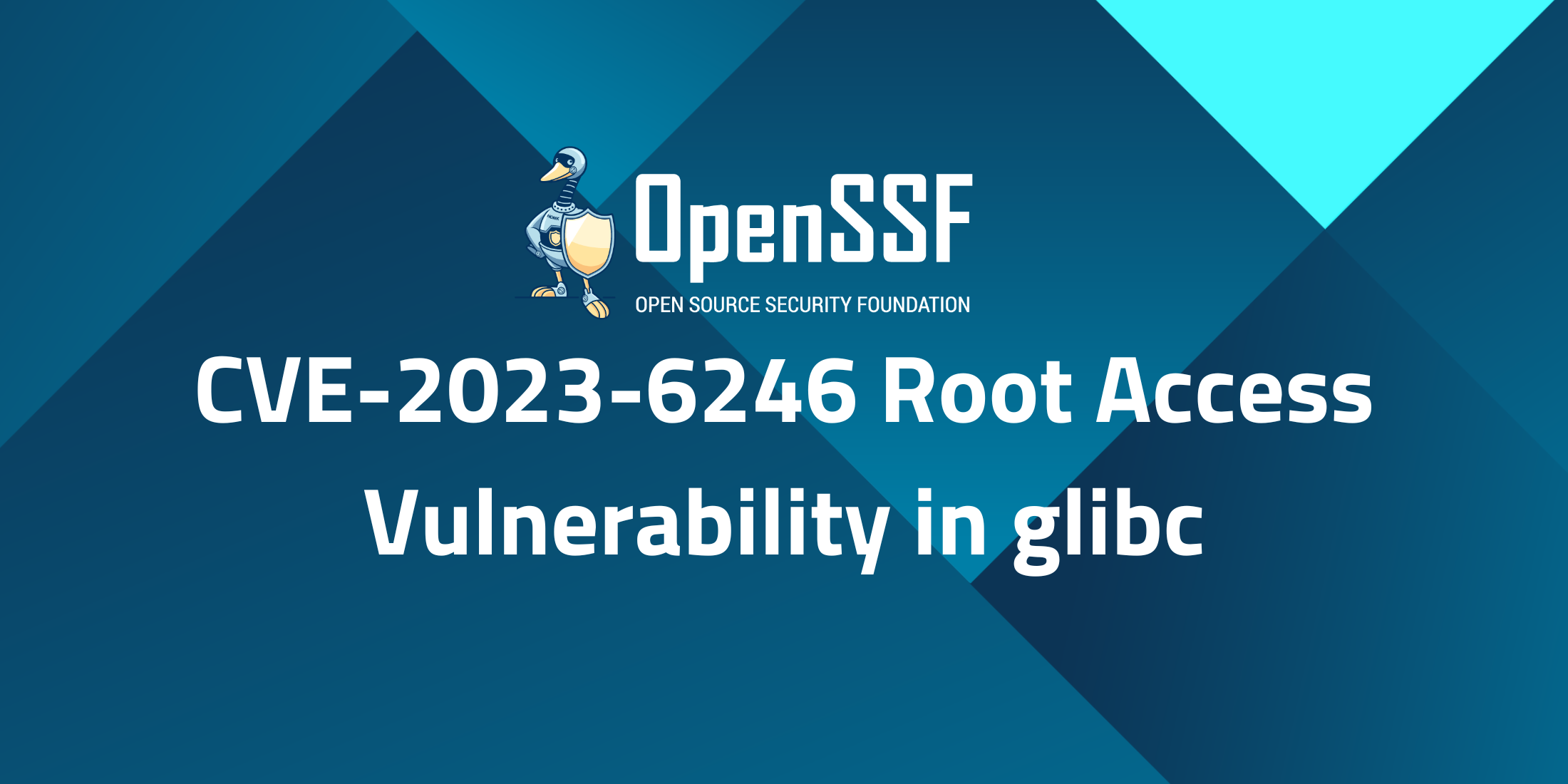
By Dana Wang & David A. Wheeler, OpenSSF
The CVE-2023-6246 vulnerability in glibc can allow an attacker to escalate their local unprivileged access to the full root privilege level. This root access, depending on the system, can allow an attacker to gain access to confidential data, exfiltrate or manipulate sensitive data, launch a ransomware attack on that system, and may enable lateral movements to gain persistent access to more critical systems. Users of vulnerable versions are urged to upgrade.
CVE-2023-6246 vulnerability in glibc
glibc (GNU C Library) is a key component of most Linux-based systems. It provides the interface between applications and the Linux kernel to perform low-level operations such as string manipulation, I/O operations, memory management, and network communications. Vulnerabilities in glibc can have widespread security implications and negative impacts.
The Qualys Threat Research Unit (TRU) originally found the vulnerability and on November 7, 2023 sent a preliminary draft advisory to OpenSSF premier member, Red Hat. Red Hat confirmed a vulnerability identified by the researchers for certain versions of glibc and assigned CVE-2023-6246. The vulnerability is a heap-based buffer overflow vulnerability in a function that supports the wisely used syslog(). Red Hat Product Security, glibc developers and glibc security team coordinated the vulnerability disclosure and successfully remediated the vulnerability on the Coordinated Release Date: January 30, 2024. The linux-distros openwall mailing list, supported by OpenSSF funding, was used for communicating the patch and the security advisory.
CVE-2023-6246 was accidentally introduced in glibc version 2.37 and was also backported to glibc 2.36 while addressing a different, less severe vulnerability. Major Linux distributions confirmed to be vulnerable are Debian (versions 12 and 13), Ubuntu (23.04 and 23.10), and Fedora (37 to 39). Red Hat reports no Red Hat products were affected as they never shipped these specific versions in a Red Hat product. Per Qualys, a similar issue was reported in December 1997 in an older Linux glibc version.
Initiatives OpenSSF Champions
This CVE highlights the significance of the initiatives that OpenSSF has been championing:
- Memory Safe Languages. We encourage the use of memory safe languages, especially for new projects. No language can prevent all vulnerabilities. However, most vulnerabilities in programs written in C or C++ are memory safety errors (such as buffer overflows), while almost all other programming languages prevent these vulnerabilities by default. This transition will be slow and difficult, so we’re working with others (such as the public sector) to enable this. See our recent blog on ONCD’s annual report and the OpenSSF Memory Safety Special Interest Group (SIG).
- Tools. We encourage the use of various tools, such as static analysis and fuzz testing, to increase the likelihood of detecting vulnerabilities before the code is deployed.
- Coordinated Vulnerability Disclosure. Mistakes will happen, so it’s important to be prepared for them. For security researchers, we have Guidance for Security Researchers to Coordinate Vulnerability Disclosures with Open Source Software Projects. For OSS projects, we have a Guide to Implementing a Coordinated Vulnerability Disclosure Process for Open Source Projects (e.g., create a SECURITY.md file to tell researchers how to report vulnerabilities).
- Tabletop exercise (TTX). We also suggest that organizations where vulnerability processing is critical perform a tabletop exercise (TTX). A vulnerability incident simulation can help an organization be better prepared for vulnerabilities. This is similar to having a fire drill to help prepare for fires.
- Software Bill of Materials (SBOM). In some cases it can be hard to determine if a library is present or not. For example, Alpine Linux is a Linux-based system that by default uses musl and not glibc. SBOMs, where accurate and available, can enable more effective identification of vulnerable technology assets and prioritization of remediation efforts.
We encourage you to participate in our Secure Open Source Software (SOSS) Community Days. The next SOSS Community Day is April 15, 2024 in Seattle, Washington, and the deadline for speaking proposals is by the end of this week on February 9th. For more information, see our blog on Submitting to Speak at SOSS Community Day North America 2024.
